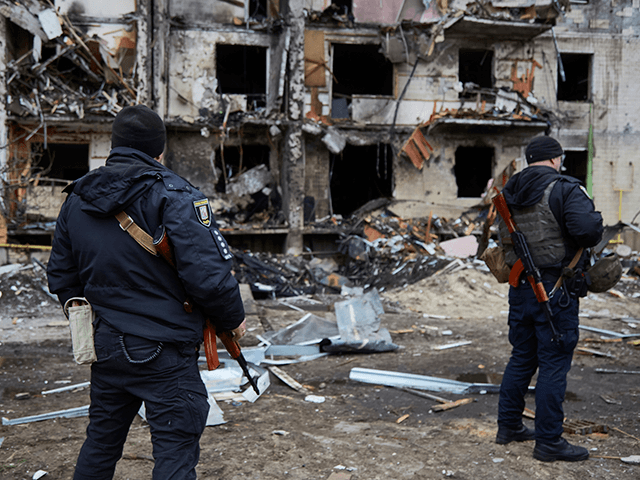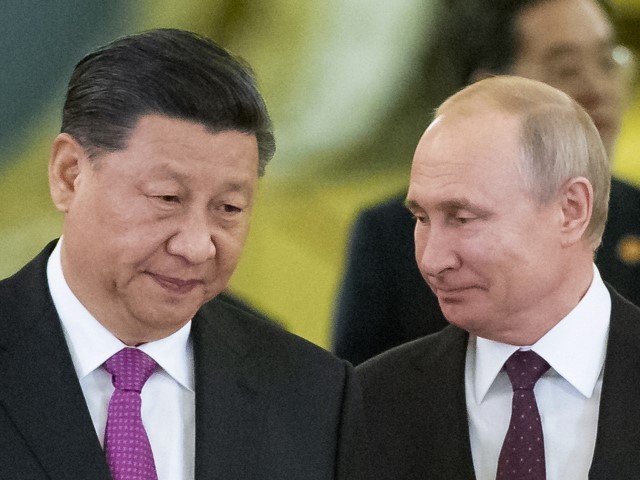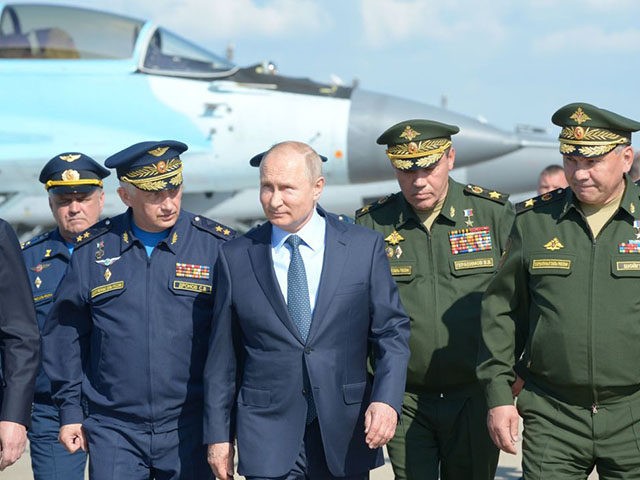The Chinese government propaganda outlet Global Times mused in a column on Friday that Russia did not have the “national strength” for a direct confrontation with NATO and that prolonged Ukrainian resistance to invasion could trigger the overthrow of leader Vladimir Putin.
Commentator Hu Xijing – the newspaper’s former editor-in-chief who abruptly lost his job after attempting to defend China over the disappearance of tennis champion Peng Shuai last year – predicted that Russia could only expect, at best, a “limited” victory from its assault on Ukraine, but that a loss could result in the end of Putin’s regime.
Putin announced a “special operation” into Ukraine last week, a major escalation of the invasion he began of the country in 2014 that resulted in Russia seizing Ukraine’s Crimean peninsula and fueling a war in the eastern Donbas region. The Russian government insists that President Volodymyr Zelensky of Ukraine is a “neo-Nazi” and Ukraine presents a “Nazi” threat to Europe. Zelensky has countered by noting that he is Jewish and lost family in the Holocaust.
The Russian invasion of Ukraine turned a week old Thursday. Russia has executed extensive military attacks on major metropolitan centers, including the capital, Kyiv, and reportedly claims its operation is going “according to plan.” Zelensky’s government consistently insists that it is actively defeating the Russian invasion.

Ukrainian police officers outside a residential building damaged by a missile on February 25, 2022, in Kyiv, Ukraine (Pierre Crom/Getty Images).
Hu described the Russia-Ukraine war as “a showdown between Moscow and NATO” that would likely result in Europe relying more on America for security regardless of the outcome.
“The continent will rely more on the US’ protection and become more hostile to Russia. So, Russia’s victory will also be limited,” Hu said, referring to an outcome in which Russia successfully eliminates the Zelensky administration. “It’s unimaginable that the military conflict will usher in a new era of Russian expansion in Europe in which Putin will seize the former Soviet Union republics and former Warsaw Pact countries one by one.”
“Russia’s national strength cannot support it to have such a confrontation with NATO, nor can the Russian people,” Hu asserted.
In an alternative in which Ukrainian resistance turns the invasion into an extended war, Hu asserted, “Ukraine, the second-largest country by area in Europe, will become a quagmire for Russia and eventually drag down Russia’s will to continue its military operation.”
“Such a result will bring a bigger impact. From the perspective of Russia, it will almost certainly lead to political instability in Moscow, or even trigger a color revolution and other unpredictable internal political reactions,” Hu predicted.
Hu described the war as “a matter of life and death” for the current Russian government and claimed the Chinese Communist Party has learned from the mistakes of the Soviet Union and the Putin regime and would not engage in a similar operation – a subtle reference to growing concerns that Putin may expire Chinese dictator Xi Jinping to invade the free state of Taiwan.
“It needs to be pointed out that many Chinese people have viewed Russia as a sand table. Everything that happens is regarded as having a special relation to China. The disintegration of the Soviet Union in 1991 taught Chinese society a lesson,” Hu concluded. “It served as a dose of political vaccine, the effects of which are lasting today. Putin has staged a showdown with the US and the West. What does this mean? The Chinese people are watching and waiting.”

Chinese President Xi Jinping, center left, and Russian President Vladimir Putin, center right, enter a hall for talks in the Kremlin in Moscow, Russia, June 5, 2019 (Alexander Zemlianichenko, Pool, File/AP).
The Chinese Communist Party has endeavored to avoid antagonizing either side in the ongoing war. While Russia is a key geopolitical ally for China, the Communist Party considers Ukraine key to its Belt and Road Initiative (BRI) connecting Beijing to western Europe and signed major infrastructure agreements with Zelensky last year after U.S. President Joe Biden lifted sanctions on Russia. Rather than discuss the role of the two belligerent parties, the Chinese Foreign Ministry has repeatedly described the war as the result of poor American policy.
“The US should give an honest account. The US claimed to defend peace by working on NATO’s eastward expansion. Is peace achieved?” Chinese Foreign Ministry spokesman Wang Wenbin said on Friday in response to a question about China’s refusal to support sanctions on Russia. “It said it were to prevent wars in Europe. Is a war averted? It advertised its commitment to a peaceful settlement of the crisis. But apart from providing military aid and beefing up military deterrence, did it do anything good for peace?”
Wang reiterated that China “welcome[s] all diplomatic efforts that are conducive to the political settlement of the Ukraine issue, and support[s] dialogue and negotiation by Russia and Ukraine for a political settlement that accommodates both sides’ legitimate concerns and is good for lasting stability and security in Europe.”
While rejecting the use of sanctions to coerce Russia into ceasing its assault, the Foreign Ministry has refused to side with Putin in recognizing the two regions of Donbas, Donetsk and Luhansk, as sovereign states. The two regions have hosted a war since 2014 in which pro-Russian separatists have fought the Ukrainian military; Putin recognized the separatists as federal governments.
Last week, the Chinese Foreign Ministry rejected the alleged sovereignty of Donetsk and Luhansk and reiterated, contrary to remarks Putin made last week, that Ukraine is a sovereign country. Spokeswoman Hua Chunying rejected comparisons between Ukraine and Taiwan, which China inaccurately considers a renegade “province.”
“Taiwan is for sure not Ukraine,” Hua insisted, calling Taiwan “an inalienable part of China’s territory.”
Hua also asserted last week that China would provide no military aid to Russia.

COMMENTS
Please let us know if you're having issues with commenting.